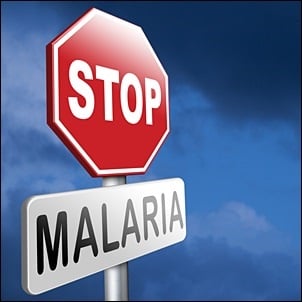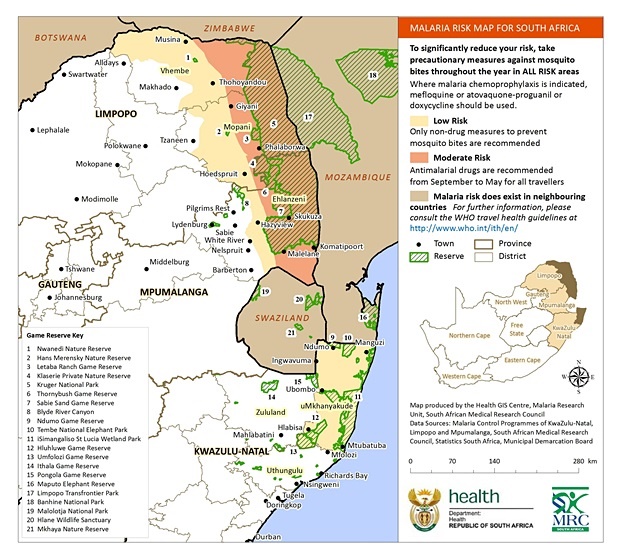
While the tide is turning against malaria deaths in South Africa as we mark World Malaria Day, drug resistance is emerging to the mosquito-borne disease, but this is not a problem in the country.
The National Institute for Communicable Diseases has assured Health24 that there is no need for the public to panic over drug-resistant malaria in South Africa.
Malaria is a mosquito-borne disease that is caused by Plasmodium parasites. It is transmitted to people through infected female Anopheles mosquitoes, and just one bite can be fatal.
Read: Drug-resistant malaria – the world's next big health crisis?
The parasites multiply rapidly in the liver and red blood cells of the infected person. Symptoms such as fever, headache, chills, joint pain, dizziness and vomiting present one to two weeks after a person is infected. If not treated within 24 hours, it leads to severe illness often resulting in death.
Much of the success in fighting the disease in South Africa is due to the use of artemisinin combination therapies (ACTs), but this is under threat with drug-resistant malaria rearing its head in Southeast Asia.
No drug-resistant malaria in SA
"We have no drug-resistance here and we do monitor it and in 2015 the currently used drugs are highly effective for malaria," said Professor Lucille Blumberg who is a deputy director at the National Institute for Communicable Diseases.
Infographic: Five facts you need to know about malaria
She explained to Health24 that in South Africa malaria is treated using a combination of two drugs. One drug is an artemisinin. This fixed combination, she said, ensures that people can't use one component of the therapy without the other part.
Prof Blumberg said this not only results in high effectiveness, but also reduces resistance.
The use of combination therapy
She said in countries like Cambodia, Myanmar and the border of India, although a combination therapy is recommended with artemesinin, the drugs are separate so there has been a lot of mono-therapy.
"There is no protection of artemesinin so drug tolerance and true resistance have also emerged leading to delayed treatment response and cure."
She added that fake drugs and poor quality drugs in her opinion exacerbates this problem.
Attempts to evade treatment
Prof Blumberg explained that the parasite that causes malaria becomes resistant to treatment as a survival mechanism. "They obviously want to survive so they produce enzymes or they change the target where the drug works."
She advised that drug resistance can be reduced by using good quality drugs, a fixed combination therapy and monitoring drug efficacy.
Prof Blumberg said that early diagnosis, effective treatment, awareness and good control are crucial to South Africa making strides in reducing the malaria infection rate as well as reducing the number of deaths.
Tight surveillance and monitoring
Monitoring the efficacy of antimalarial medicines is a key component of malaria control, said Sylvester Jobic, head of environmental science for Bayer in sub-saharan Africa.
"As long as good surveillance and monitoring remains in place, such as ensuring the correct use of the correct choice of insecticides, accompanied by malaria medication and bed nets (that is, all round protection by three sources), malaria should be able to be controlled.
Read: Malaria doesn't have to be deadly!
"The consequences of resistance can be devastating. For instance, when chloroquine resistance spread across Africa in the 1980s, there was a dramatic rise in Malaria-related deaths."
However, he pointed out that protecting the efficacy of ACTs as the current first-line treatment for Malaria is among the top global public health priorities.
The efficacy of indoor residual spraying
"Further, the mainstay of vector control is indoor residual spray (IRS) application to the inner walls of houses once or twice a year. Frequency depends on the insecticide used, with different chemicals used for traditional mud and thatch buildings and Western type structures. Over the past seventy years, IRS has been a critical factor in decreasing the disease burden to levels that make elimination possible."
Jobic said the indoor residual application in South Africa works very well.
He said some of the vital and basic ways the public can do to protect themselves from malaria is:
- If you live in an endemic area and there is indoor residual spray campaign, make sure your house is treated.
- When visiting malaria areas, use repellent, coils, and make sure you sleep under treated bed net.
- If you have any flu-like symptoms after visiting a Malaria prone region – do get tested as early detection is key.
Click on this map to have a look at malaria risk areas in South Africa
 Source: Department of Health
Source: Department of Health
Also read:
Superbugs threaten to kill 10 million a year
Malaria deaths in South Africa climb




 Publications
Publications
 Partners
Partners











